By most conventional measures, Obafemi Martins’s loan spell with Birmingham City could not be deemed a success. Recruited in January 2011 to score the goals that would keep the club in the Premier League, he only found the net twice and his season was cut short by injury when he was needed most. The club was relegated in his absence. Yet something remarkable, and unexpected, happened in his fourth appearance.
A late substitute in the League Cup final, Martins had only been on the pitch for six minutes when a moment of confusion between Laurent Koscielny and Wojciech Szczesny led the ball spilling at his feet with the goal gaping. He couldn’t miss and Arsenal had no time to recover. In the strangest of circumstances, the Nigerian striker marked his temporary stay at Birmingham City with perhaps the most significant goal in the club’s history. His simple finish secured a 2-1 win and only the second major trophy for a club that had been founded in 1875.
“The celebrations were huge,” says Liam Ridgewell, the Birmingham left-back. “They went on for days. It was an unbelievable feeling to have actually done it when so many people said we wouldn’t. That was probably a big part of it – that we wanted to prove everyone wrong: that we could win against a big team. It was a great afternoon, a great evening, a great night, a great early morning and a great next day. It was well worth celebrating.”
Beating Arsenal in a packed Wembley was a far cry from how the cup run began. There were only 6,431 fans at a rain-soaked St Andrew’s for their second-round tie with Rochdale, which proved far from straightforward. A much-changed Blues side briefly trailed to the League One team but they rallied to win 3-2. Late in the second half, the fans were given a first glimpse of the lively Nathan Redmond, who at 16 became the club’s second youngest ever player after Trevor Francis. It was one of the few notable moments of a largely forgettable and unconvincing display.
A favourable draw meant Birmingham City did not face Premier League opposition until the quarter-finals and were at home throughout that run. MK Dons were beaten comfortably enough in the third round, summer signings Alexander Hleb and Nikola Zigic scoring their first goals for the club.
Brentford were the third consecutive League One side to visit St Andrew’s in the competition and Sam Wood’s volley put them in control. The Bees were leading deep into injury time when Kevin Phillips grabbed a late equaliser. Penalties were needed to squeeze through to the next stage, where Aston Villa awaited. “We didn’t play well and we scraped through that,” says Stephen Carr, the experienced right-back and club captain. “There are always turning points with cups. We rode our luck there and got through. There are loads of things like that in the cups. It can just change and you think: ‘Maybe we have got an opportunity.’ I think that’s happened to a lot of teams.”
“I get reminded about the Brentford game a lot because one of my best mates is Sam Wood, who scored a volley in that game,” says Ridgewell. “I didn’t know him as well then as I do now, otherwise I’d have tried to kick him a bit harder.”
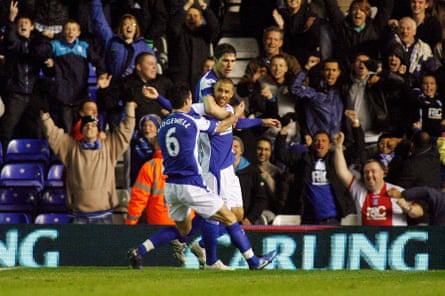
After three relatively understated ties, the visit of Aston Villa ratcheted up the tension considerably. The atmosphere was transformed for the first second-city derby to be played under the lights since 2003, when a Birmingham City win at Villa Park had featured a headbutt, two red cards and trouble in the stands.
From then on, meetings between Blues and Villa had been consigned to early Sunday afternoon kick-offs in an attempt to suppress any crowd issues, but no such change could be made to the League Cup schedule. So, on a cold December night, a full-strength Blues side were buoyed by a raucous home support. Both teams meant business.
“Bloody hell. That was unbelievable,” recalls Carr. “I love derby games – they already have that spice – but to have it in a cup as well … I just remember the atmosphere. How loud it was. Oh my god. My family and all my mates were there. It was just something so special, especially beating them. For players, it’s about getting through to the next round. We know how big the derbies are but, for us, we have to treat it as another game. For the fans, it’s more than that.”
Blues made the breakthrough after just 12 minutes. Cameron Jerome hunted down the ball and teed up the onrushing Lee Bowyer, who was tripped in the area by Richard Dunne. Sebastian Larsson took responsibility, stepping up to score past Brad Friedel. Gabriel Agbonlahor, who enjoyed a great record in derbies, equalised for Villa before half time. Being subjected to endless taunts and provocations never seemed to put him off his stride.
Jerome and Zigic, whose substantial wage and ungainly appearance often made him an easy target for frustrated supporters, combined to send Blues through as extra-time beckoned. A low pull-back from the right found Zigic, who scuffed the ball in off Luke Young to spark wild celebrations and begin his ascent to cult hero status. “The atmosphere was incredible,” says Ridgewell, who had started his career at Villa. “When we played Villa before I scored an own goal and we lost, so I didn’t have great memories of playing against them. Beating them on the night went a long way to rectifying that day. After beating your rivals at home, you start to dream of Wembley.”
At the final whistle there was a pitch invasion from Blues fans looking to goad their Villa counterparts. Rows of police officers tried to hold back the tide as flares were set off by both sets of supporters. Various objects, including seats, were thrown. The stadium announcer’s appeal for a return to order was ignored. A £20,000 fine was later imposed for the disorder but, by then, Birmingham City had already won the cup.
“Coming to the end of the match, we sort of expected the pitch invasion, so we were quick to get down the tunnel afterwards,” says Ridgewell. “It was such a big win, and the night and the occasion was unbelievable. The atmosphere was incredible, so it went hand in hand with that. It was such a great night. I didn’t get to see too much of the pitch invasion, but I certainly heard about it.”
“The atmosphere. The pitch invasion. It was just old-school football, like it used to be,” says Carr. “The atmosphere was out of this world. You could see what it meant to beat their rivals. It was huge.”
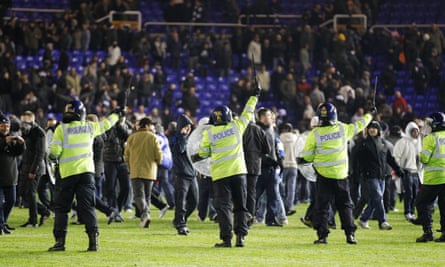
West Ham were the last obstacle to overcome before the final. Birmingham City lost the first leg 2-1 and were in dire trouble when Carlton Cole struck again to put them further behind behind at St Andrew’s. They were 3-1 down on aggregate, with 45 minutes to save themselves, when Alex McLeish decided to roll the dice.
“I still thought it was possible,” says Ridgewell. “I still believed we could do it because of the rounds we’d already been through. I felt we were destined to get to the final and go all the way. It was an unbelievable strike from Carlton Cole. A one-in-a-million goal that was a bit of shock to the system. But it spurred us on a little bit. It gave us a little bit of balls and a bit of bite to go on and get through. At half-time we were like: ‘Right, let’s just go for it. We’ve got nothing to lose. We’re in the second leg of a League Cup semi-final. It’s make or break. Why not just go for it and start attacking them?’ The crowd was willing us on. It was hell for leather. With every goal the crowd got even louder, and the players got more belief. It was unbelievable.”
Zigic came on for Matt Derbyshire and transformed the dynamic. As the West Ham defence dropped back to protect its lead, the substitute’s height and aerial threat came to the fore. Blues went direct, seeking out Zigic at every opportunity. The pressure mounted and eventually told.
“You have to make sure you don’t leave anything out there,” says Carr. “You had a good group of lads. They weren’t flash, nothing like that. They worked tirelessly for each other and had a massive determination. This was an opportunity that you might not get again, so just give it everything, We came out and went for it. They didn’t know what had hit them. We were relentless. They couldn’t catch their breath. We were on them and the fans were getting behind us. We got our rewards in the end.”
From a Larsson corner, the ball fell to Lee Bowyer, who rattled in a half volley just before the hour mark. One more goal was needed to send the game to extra time, and it arrived from another corner. This time Bowyer drilled the ball in and Roger Johnson rose highest to head home. The momentum had swung in their favour.
In the first half of extra time, Carr seized possession and surged down the right. Approaching the box, he played the ball back inside to Craig Gardner, who tried his luck from distance once more. It wasn’t the cleanest of efforts, but it was just enough to beat a sprawling Rob Green and send Birmingham through.
“When you have your fans behind you, driving you on, you can feel something,” says Carr. “You could see all the lads had that desire to win the game. It was a special game to be involved in. You don’t get them all the time. At home, to come back and get the result, fans going mad, going to a cup final. Amazing. The players were buzzing.”
The ticket allocation for Blues’ first Wembley final since they beat Carlisle United in the 1995 Auto Windscreens Shield sold out quickly. Thousands descended on London on a grey February afternoon. “I realised what a big deal it was when me and Craig Gardner went to a forum with [local radio presenter and Blues supporter] Tom Ross,” remembers Ridgewell. “We sat up on the stage and they opened it up to the fans. They were saying they’d rather win the Carling Cup than stay in the Premier League. Me and Craig obviously wanted to stay in the Premier League, for the club to push forward and get better.
“You always dream about getting to a cup final at Wembley but, unless you play for one of the big teams, do you ever really believe you’re going to get there? Probably not. It was amazing. Getting your suits fitted, sorting tickets, sorting hotels for family. Just the excitement around it was incredible. Even the drive down to the hotel in London was amazing and something to look forward to.”
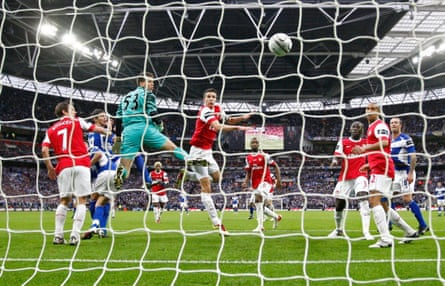
Despite their recent struggles under Arsène Wenger, Arsenal were still clear favourites. There were even discussions about who would lift the trophy, with captain Cesc Fàbregas ruled out through injury. A brittle yet occasionally brilliant team, Arsenal had shown the two sides to their character in the games leading up to the final. They had beaten Barcelona 2-1 in the first leg of a Champions League tie and then conceded a late equaliser to draw with Leyton Orient in the FA Cup.
Birmingham City were missing the centre-back Scott Dann, so Martin Jiránek deputised. The former Arsenal players Hleb and David Bentley were also absent, one injured and the other cup-tied. A cautious Alex McLeish went for one up front, with Zigic supported by runners from midfield.
The Birmingham City players noticed a degree of overconfidence in their opponents. “Arsenal winning the Carling Cup isn’t the same as Blues winning the Carling Cup,” says Carr. “Would there have been a bit more confidence and arrogance from them? Definitely. They could say there wasn’t, but there was a confidence from their fans that they only had to turn up. When you have that, it doesn’t matter who you’re playing against, it’s a big mistake.”
Ridgewell agrees. “We all turned up in our suits, went outside and looked at the pitch,” he says. “I always remember Liverpool doing it for the FA Cup final when they had their white suits on. So we did the same. Then I remember Arsenal walking in wearing tracksuits like it was a normal day for them. A normal Saturday game. At that point I was looking around at the boys and they all thought: ‘Hang on a second. They just think they’re going to turn up and walk all over us. That was the turning point for everybody to go: ‘You know what, let’s fucking stuff it up them. Let’s go and win the game.’
“Our instructions were to follow who you were up against to the death. You stick with them and man-mark them. Every time they got the ball, the manager wanted us to be centimetres away from them. He wanted us to be tackling them every time. The gameplan was just to get stuck into them and, when we got a chance to get the ball, to stick some crosses in. To get it into Nikola Zigic and play off him. It worked a treat.”
The game started brightly for Birmingham City. Zigic sent Bowyer through on goal and he was brought down by Arsenal goalkeeper Wojciech Szczesny. Play was pulled back for offside but replays revealed it to be an incorrect decision. A penalty and a red card would surely have followed. Blues brushed off that injustice to take the lead anyway, preying on Arsenal’s frailty from set pieces. Larsson hung a corner up to the edge of the box and Roger Johnson’s header was flicked on well by Zigic. The blue half of the stadium erupted.
“It was the perfect start,” says Ridgewell. “Nikola Zigic was magic for us. Over the years Arsenal got weaker and weaker on set pieces. They certainly were at that point. We knew they were a better footballing team than us, but we knew they weren’t going to outwork us and that we could get them on set pieces. We were playing to our strengths.”
The lead wasn’t to last. Arsenal engineered a brilliant equaliser, Robin van Persie scoring with a superb volley. However, he was injured in the process. Former Birmingham loanee Nicklas Bendtner came on in his place, while Marouane Chamakh replaced Arshavin. Both were kept at bay impressively by Ben Foster, who made 11 saves and won the man of the match award. At the other end, Keith Fahey rattled the post. Then, against the run of play, came Martins’s moment.
Stephen Carr helped to alleviate the mounting pressure by winning a free-kick deep in Birmingham’s half and Foster thumped it forwards speculatively. Zigic won the header and neither Koscielny nor Szczęsny were decisive enough in claiming the ball, which fell invitingly to Martins 10 yards out. His shot seemed to take an age to hit the net. Martins wheeled away, chased by ecstatic teammates, as another roar went up from the Birmingham end. A wonderfully elaborate and acrobatic celebration, one of the striker’s trademarks, followed the most uncomplicated of goals. Arsenal had wilted, twice undone by a simple, direct approach.
“Zigic is a handful,” says Carr. “It’s not even Zigic winning the ball, it’s what you get from it, because he’s awkward, not easy to play against. That was a strength for us. You’ve got Lee [Bowyer] as well, running off Zigic. A clever runner, getting into positions. We’d got Roger Johnson as well, who was strong in the air. We knew we could get things from set pieces, so we had to maximise that when we did have them.”
The plan worked. Scenes of disbelieving joy among players, staff and supporters greeted the final whistle. This wasn’t meant to happen. Not to a club like Birmingham City, in such grand surroundings, against as storied an opponent as Arsenal. They were both Premier League sides but the gulf between them was massive and made victory all the sweeter.
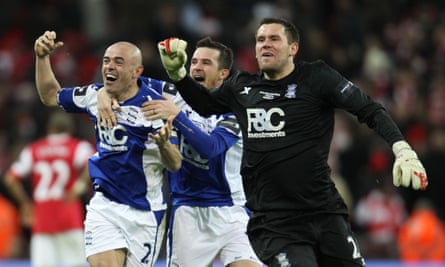
“It was amazing,” says Ridgewell. “Even thinking about it now puts a smile on my face. It was an unbelievable feeling to know you’ve won a huge cup final against a massive team. And scoring so late on was just phenomenal. Scoring right at the death made it even better. I didn’t really know where to run or who to go and celebrate with.”
Carr, who had come out of retirement to join the club on a short-term contract just two years before, led his team up the steps and lifted the trophy. He had won the League Cup 12 years earlier with Tottenham but this was different. “I was one of the younger players in the team and was at a club where it’s expected that you win things. Not that they won tonnes and tonnes, but there is more of an expectation. When you’re younger you take things for granted. You enjoy the moment, but don’t think about it as much. When you get older, to have another opportunity of winning it was a completely different experience for me. To get a club, come back and win a cup was like a fairytale.
“No one would give me an opportunity. Ten months out of the game. No football training, just running, doing my own thing. Then coming back, being on trial at Birmingham. We went up on the last game of the season, then went on a great run in the Premier League. To not be playing and then to have that chance, with a club where I was never really thinking about winning a cup… I never thought I’d have that, especially later on in my career.”
There would be no open-top bus parade or civic ceremony as Blues focused on their survival effort. There were 12 league games left to beat the drop, but they won just two of them, slipping into the relegation zone on the final day. “The big problem was that we didn’t have a massive squad and, the further we went in the competition, the more the boys wanted to play,” says Ridgewell. “If you had a knock or were struggling, you just got through it to get to the cup final. It took more of a toll than we all realised. After the final, towards the end of the season, it was a fight. We were struggling because we had a lot of injuries. People were limping along to get to the cup final and afterwards you suddenly feel a bit drained.
“We were such a good team, so to get relegated was devastating, certainly in the fashion we did. It took a long time to get over it, if you ever do. I still think about it now. We had a very good team and one we could have built on for next season. But, after that, the team was dismantled and everyone went their own way. People talk about players leaving and that it was easy to go. It wasn’t. It was tough for everybody who left that team because we didn’t feel that we should have gone down, or deserved to go down. But, sadly, that’s football.”
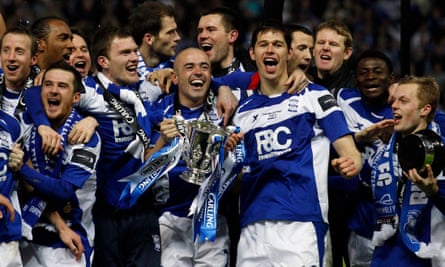
Carr is still at a loss to explain what went wrong. “I wish I had the answer,” he says. “It’s a strange thing. It wasn’t as if everyone got carried away and downed tools. We just couldn’t seem to get any momentum. We had a few injuries, but even that’s no excuse. It was such a low, low point in my career from one of the highest points in the club’s history. It was horrible. All of a sudden, it’s a different club.”
A summer of sweeping changes followed. McLeish defected to Aston Villa. Club owner Carson Yeung was arrested, and eventually imprisoned, on money laundering charges. Austerity measures were imposed to prevent the club from falling into administration. New owners eventually arrived but have only contributed to the uncertainty, with a raft of different managers, several near escapes from another relegation, a transfer embargo and a points deduction.
Yet, if you ask most supporters, they wouldn’t have it any other way. The concept of genuine, unalloyed success sits uneasily with Blues fans, so some painful consequences were perhaps only to be expected. Winning the League Cup felt like a seismic moment in the club’s history and its significance has only grown given subsequent events.
“Incredible,” says Ridgewell “It even gives me tingles now and puts a smile on my face just to know that we did such an amazing thing. To win a major trophy with Birmingham is unbelievable. Hopefully we can all meet up again and talk about it, and celebrate again one day, and look back on how incredible it was. It was a great time and one that I, and all the other players, really enjoyed.”
“It’s obviously very sad how the club has gone since then,” says Carr. “It’s terrible. The fans don’t deserve that but they’ll have that memory for the rest of their lives. For us, as players, we’ll always remember. I’m very privileged to have had that opportunity – to captain such a great group of lads and to win a cup with them and give it to the fans.”
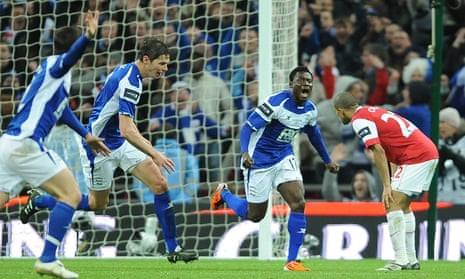
Comments (…)
Sign in or create your Guardian account to join the discussion